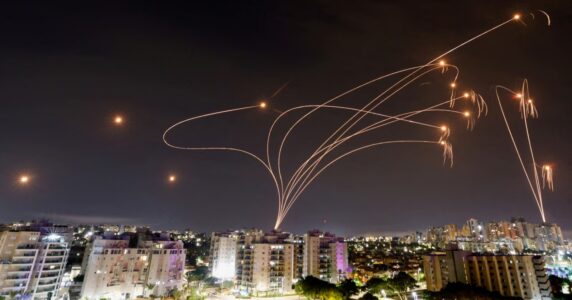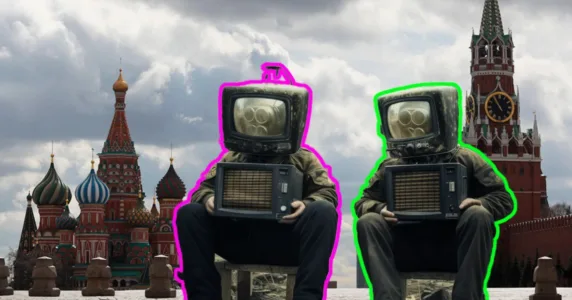Navigation and useful materials
With the beginning of Russia’s full-scale invasion of Ukraine, the world began to realize the pernicious and dangerous power of Russian propaganda and the criminal intentions of those who broadcast it. So, the countries of the world, one by one, stop broadcasting TV channels of propaganda media, and the Russian propagandists find themselves in the sanction lists.
The Centre for Strategic Communication and Information Security analysed how the world is fighting the Russian propaganda.
Russian Propaganda Media: Sanctions and Blocking
Back in 2014, Ukraine was one of the first countries to ban the broadcasting of 14 Russian TV channels. Among them: “Pervyi Kanal. World Wide Web,” “RTR Planet,” “NTV,” “NTV Mir,” “Russia-24,” “Russia-1,” “TNT,” “Peterburg-5,” “Zvezda,” “REN TV,” “TV Center-International” (“TVCI”), the Russian version of “Euronews,” RT, and Life News.
Back then, such actions caused outrage and concern of the world community, and international human rights organizations of the OSCE and the EU called on the Ukrainian authorities to be extremely careful when making a decision to ban or censor the media.
However, over time, the world began to realize that the issue of blocking Russian content is not only a matter of information, but also of national security.
Thus, in 2020, before the full-scale invasion of Russia into Ukraine, the broadcasting of Russian TV channels from the RT network was banned in Lithuania and Latvia. The reason for the blocking was the connection of the media with the propagandist Dmitry Kiselyov, who is under EU sanctions.
After the full-scale invasion, Latvia continued to counteract Russian propaganda resources. The National Electronic Mass Media Council (NEPLP) decided to ban from June 9, 2022, the broadcasting of 80 remaining Russian TV channels that could still be watched on the territory of Latvia.
Later in December, Latvia added the TV channel “Rain” to this list. NEPLP revoked the licence of the Russian TV channel “for security reasons.” The regulator assessed a set of violations that the channel recently committed: the lack of an audio track in the state language for broadcasts, the image of Crimea on the map as part of the territory of Russia, the TV presenter of the channel calling the Russian army “our army,” as well as the expression of support for the Russian army.
In March 2022, the EU also imposed sanctions on Sputnik and RT/Russia Today (RT English, RT UK, RT Germany, RT France, RT Spanish) and stopped their broadcasting in EU countries.
And in December, the ninth package of sanctions from the European Union banned the broadcasting of four more Russian media — NTV/NTV Mir, Russia 1, REN TV, and Pervyi Kanal on the territory of the EU.
Now, according to the National Council of Television and Radio Broadcasting of Ukraine, after the beginning of Russia’s full-scale invasion of Ukraine, 30 countries in Europe stopped broadcasting Russian propaganda channels Russia Today and Sputnik. The most active in countering Russian propaganda are the Baltic States and Poland.
In December, Moldova also suspended the licence of six TV channels that disseminated disinformation about Russia’s war against Ukraine — the Moldovan TV channels TV6, Orhei TV. Primul în Moldova, Accent TV, as well as the Moldovan versions of the Russian broadcasters RTR Moldova and NTV Moldova. The licences of the channels were suspended in order to “protect the national information space and prevent the risk of disinformation, by disseminating false information or attempts to manipulate public opinion.”
In addition, the restrictions on the broadcasting of Russian state media due to Russia’s full-scale invasion of Ukraine were also reported by telecommunications providers in Australia, Canada, and the United States.
In May, the United States imposed sanctions against “Pervyi Kanal,” “Russia-1,” and “NTV.” Then the British authorities also imposed sanctions against VGTRK and individual journalists from Russia. Restrictive measures were also taken against the so-called “war correspondents” Poddubny, Kots, Steshin, TV presenter Leontiev, as well as the chairman of the board of directors of Pervyi Kanal Oreshkin.
However, the greatest attention in the context of sanctions and broadcasting restrictions since the beginning of the full-scale invasion was paid to the Russian propaganda state media RT. Read about how the world is fighting the Kremlin media, and propagandists are looking for new ways to influence foreign audiences in the material of the Centre for Strategic Communication and Information Security.
RT is a global propaganda machine with numerous channels for spreading propaganda and disinformation campaigns, which requires the same global clean-up from the information space of the civilized world. For this, partial or regional blocking is ineffective, only coordinated actions of states in blocking the broadcast of the channel, a complete ban on the propaganda resource and its content by technological platforms, and a conscious refusal to consume propaganda content by citizens of countries can silence Kremlin propaganda.
Why the world should more actively block RT resources can be found in the study of the Centre for Strategic Communication and Information Security “RT: Why Russian State Media Has no Place in the Civilized World” based on the analysis of the content of the Russian and foreign offices of the Kremlin propaganda resource.
Enforcement of sanctions at the level of telecommunications companies and providers is also important. For example, even after the implementation of EU sanctions against RT and other Russian propaganda channels, the French satellite communications operator Eutelsat continued to broadcast Russian propaganda for quite some time.
Reporters Without Borders, led by the general secretary of the organization, Christophe Deloire, led the Ukrainian initiative to ban the broadcasting of Rossiya 1, Pervyi Kanal and NTV through Eutelsat. Reporters without Borders won the court case. The French Council of State decided to suspend the decision of the French media regulator Arcom, which refused to ban the broadcast of Russian propaganda channels on the French satellite operator Eutelsat.
The regulator also discovered that the channels were broadcast not only in Russia, but also in the temporarily occupied territories of Ukraine. In the near future, Eutelsat will no longer broadcast the Russian propaganda channels Rossiya 1, Pervyi Kanal and NTV. It is essentially about the provider’s complete refusal to cooperate with these TV channels, since the suspension of broadcasting does not only apply to EU countries where sanctions have been implemented.
Read more about Eutelsat and its role in spreading the Russian propaganda in the material by the Centre for Strategic Communication and Information Security.
Sanctions against propagandists
However, TV channels are only communication resources, while disinformation messages, propaganda narratives and genocidal rhetoric are promoted by propagandists. Therefore, since the beginning of Russia’s full-scale invasion into Ukraine, sanctions have also been imposed against Russian propagandists.
For example, back in February, the EU imposed sanctions on head of key propaganda channel RT Margarita Simonyan and TV host Vladimir Solovyov. Sanctions include the freezing of assets on the territory of the EU, a ban on entry to and transit through EU countries.
TV presenter Olga Skabeeva, director of the Russian-language RT service Anton Krasovsky, propagandist and filmmaker Tigran Keosayan also received their share of sanctions for spreading disinformation.
Blocking and limiting the spread of Russian propaganda in social networks
Since 2020, the company Meta has been labelling the pages of Russian state media on Facebook and Instagram as “funded by the Russian government.” After Russia’s full-scale invasion of Ukraine, Meta also began to lower the priority of pages and posts by Russian propaganda resources and made it more difficult to find these resources on Facebook and Instagram around the world.
In addition, Russian state media were banned from advertising or monetizing their posts on the company’s platforms.
In addition, at the request of the government of Ukraine, access to the pages of Margarita Simonyan and Anton Krasovsky, Russian propagandists and TV presenters Tina Kandelaki, Vladimir Solovyov and others, was restricted for Ukrainian users. These people support Vladimir Putin and the war against Ukraine, which is why most of them have been targeted by sanctions. At the same time, in the EU and the UK access to Russia Today and Sputnik have been limited in line with government requests and sanctions imposed.
In addition, Meta works with independent fact-checkers to debunk false claims. After verification by fact-checkers, fake posts are marked with a corresponding mark and their visibility is reduced in priority.
YouTube has also blocked Russian propaganda channels RT and Sputnik across Europe, and in Ukraine, Pervyi Kanal, Rossiya 24, Rossiya 1, TASS, RIA Novosti, RBC, and Zvezda TV are also blocked. In addition to the YouTube channels of the Russian media, the video hosting also blocks the accounts of certain pro-Kremlin propagandists, such as the Russian presenter Vladimir Solovyov’s “Solovyov LIVE” and his show “Evening with Vladimir Solovyov”, propagandist Anatolii Sharii, his wife Olha Sharii, and their channel “Double.”
Even after being blocked and targeted by sanctions, Russian propagandists continue finding loopholes and creating new communication channels. For example, in November this year, RT announced the launch of a new multimedia online propaganda portal RT Balkan in Serbian, and it has even established a YouTube channel. YouTube, though, blocked the channel pretty soon, right the following month.
Russian propagandists claim that blocking TV channels and social media pages infringes their “freedom of speech.” However, they do not mention that the Russian media themselves, and above all, those that are directly financed by the Russian Federation, have nothing to do with freedom of speech. Since they reproduce the same Kremlin techniques, they are subject to the same Russian censorship regarding their coverage; otherwise, they would have long been recognized, at least, as “foreign agents”, or blocked by Roskomnadzor on the territory of Russia and deprived of Kremlin funding.
Thus, the world is already beginning to understand that Russian media are nothing but sources of the Kremlin propaganda undermining the values of a democratic world, and that they have no place in the civilized global media space. Russian propaganda and its propagandists are fully responsible for turning information into a weapon against Ukraine and the world.
Centre for Strategic Communication and Information Security
If you have found a spelling error, please, notify us by selecting that text and pressing Ctrl+Enter.



